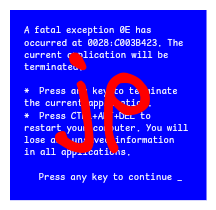I write several flavours of BASIC fluently, Fortran and Pascal passably, three forms of assembler well enough to get by, and I’ve worked in COBOL.
Python malfeliĉas min.
Mi pensas ke, vi volis tajpi, “Python (aŭ Pitono) malfeliĉigas min.”
- Mal : Opposite
- Feliĉ- : Happy
- Ig : Makes (Transitive verb)
- As : Present tense.
“Mi malfeliĉas.” : I’m sad.
“Pitono malfeliĉigas ĉiujn.” (Python makes everyone sad.)
Kia domaĝo. La unua programlingvo kiun mi lernis estis Python. Ĝi multe helpis min kompreni programadon kaj lerni aliajn programlingvojn. Simile estas kun Esperanto. Ĝi helpis min lerni la francan kaj faciligis la lernadon de alia gramatikaĵo.
Ho, kaj mi ankoraŭ povas paroli Esperanton.
Why is everyone down on Rust? Seriously. I don’t know it but I’ve considered learning it and it appeals to me and people literally scoff when I mention it. Saw it referred to as a meme language on Lemmy, which is built in Rust. What am I missing?
Cause it’s a C++ replacement when said audience never asked for one. It’s great but it’s still waaaayy too early, people need to slowly get comfortable with it.
I think ppl just got pissed with the fanboys unironically asking to RIIR everything. The language itself is comfy AF, tho
I don’t think many ppl are down on rust… it’s won developer’s most favorite to use for like 5+ years now in a row on stackoverflow.
For me “The Critical Flaw” of rust is its compiler. And requirent of 12 GB of disk space to compile just the frontend of compiler. Even GCC will all frontends(C, C++, Ada, Fortran, Modula-2, JIT) requires less space.
But joke is probably about “rewrite in rust” culture.
that’s because Rust is more modern and in modern days we don’t rly have hard disk limitation, also it’s probably because the compiler tells you the solution to most problems
and in modern days we don’t rly have hard disk limitation
well if you are a corporation, that’s true. Otherwise, not much
I mean c’mon, every pc that can compile rust in a reasonable time has at least 20gb of storage
Maybe someone ought to rewrite rust in C.
Wow that’s enormous. I’ll have to learn more about that. Thanks for the info!
i think it’s mainly people being cranky and set in their ways. they got used to working around all the footguns/bad design decisions of the C/C++ specifications and really don’t want to feel like it was all for nothing. they’re comfortable with C/C++, and rust is new and uncomfortable. i think for some people, being a C/C++ developer is also a big part of their identity, and it might be uncomfortable to let that go.
i also think there’s a historical precedent for this kind of thing: when a new way of doing things emerges, many of the people who grew up doing it the old way get upset about it and refuse to accept that the new way might be an improvement.
Some rust proponents having this attitude is probably part of the problem.
Is Rust as close to the metal as C? Seems like there would still be a need for C. I could see Rust replacing Java as something that’s so ceremonial and verbose, but from my limited perspective as a sometimes java dev, having only the most glancing experience with C, it seems like C would be hard to replace because of what it is. Buy I honestly don’t know much about Rust either, I just think JS is so finicky and unpredictable whereas web assembly seems extremely fast and stable.
Rust can create native binaries but I wouldn’t call it close to the metal like C. It’s certainly possible to bootstrap from assembly to Rust but, unlike C, every operation doesn’t have a direct analog to an assembly operation. For example Rust needs to be able to dynamically allocate memory for all of its syntax to be intact.
For example Rust needs to be able to dynamically allocate memory for all of its syntax to be intact.
Hmm, you got an example of what you mean?
Rust can be used without allocations, as is for example commonly done with embedded.
That does mean, you can’t use dynamically sized types, likeString,VecandPathBuf, but I wouldn’t consider those part of the syntax, they’re rather in the std lib…So you’re right that this is a bit arbitrary because the line between the standard lib and the language is blurry, but someone writing Rust is going to expect Vec to work, it doesn’t even require an extra “use” to get it.
Perhaps a better core example would be operator overloading (or really any place using traits). When looking at “a + b” in Rust you have to be aware that, depending on the types involved, that could mean anything.
Anyway, I love Rust, it just doesn’t have the 1:1 relationship with the assembly output that C basically still has.
Thank you for the explanation.
It’s slightly less close to the metal as C. Array bounds checks are always going to cost you something, for example. However, if you look at the speed of numeric computation in C, Rust, and Go, they’re all in the same order of magnitude performance compared to things like Python or JavaScript (not including things like PyPi, which is C with extra steps).
Wow thanks so much for breaking that down for me! The discussions I’ve been having here and the information devs are sharing is really kicking me off the fence about learning Rust
Eh, I’d still go for it. I find the Rust compiler tends to amplify my impostor syndrome–it tells you all the ways you are objectively being stupid. I know that’s not really selling it, but it’s doing that stuff for a reason. I’m especially hopeful that it becomes the standard way to do things with microcontrollers; that’s about the only place I write C/C++ at all.
Noted!
I mean, the simple proof is that Rust has been growing by leaps and bounds in the embedded world, which is the closest to bare metal you get. It’s also being used in the Linux kernel and Windows, and there are several projects building new kernels in pure Rust. So yeah, it’s safe to say that it’s as close to the metal as C.
Also, the comparison to Java is understandable if you’ve only been exposed to Rust by the memes, but it doesn’t hold up in practice. Rust has a lot more syntax than C (although that’s not saying much), but it’s one of the most expressive languages on the market today.
Imo it’s bc it’s the new kid on the block. Yes it’s 10 years old but barely becoming common use in production and government mandates are only speeding that up. In actuality it’s a great language and has been hyped for a few years by people who actually use it. Python went through the same thing in the 2010s where devs really tried clowning on it, now it’s used everywhere.
Good to know, I’ve only been a dev since 2019 so I appreciate the long view
I think rust has good ideas and may even become the default systems language in the mid-term. I find it irritating that there is a very vocal subset of rust proponents that tend to insist that every project in every language needs to be rewritten in rust immediately. I suspect that is also why other people are down on rust.
That makes sense! Thanks for your insight
Butthurt C devs don’t want it replacing their language.
as guy who likes c: think rust is a good and cool idea
Out of curuosity, what is the programming equivalent of Japanese?
Can’t imagine there is any. You need to learn three scripts to read Japanese fluently IINM. Katagana, Hirigana and something else… Probably someone who speaks Japanese can say.
The something else is called kanji, and are very complicated characters stolen from China with many meanings and pronunciation. Learning Japanese is very 楽しい (it is really)
I was tempted to say Ruby, but based on my friends that are learning (or tried to learn Japanese), it seems like Ruby is trying to be the opposite. So not sure.
Ruby would maybe fit with toki pona : terse, simple, predictable.
Ruby is literally Japanese. It was invented there. Plus a Danish guy popularized it outside of Japan. Like how weebs spurred interest in Japan and the Japanese language outside Japan.
I was going to say toki pona is not quite brainfuck but at least somewhere in that direction, with its tiny vocab
Forth
APL
APL
Clojure, a simple grammar but most of the vocabulary is imported from another language.
I finally found the real reason why I like java: I‘m german
I also love Java, especially all the goodies added in 17. I’m not German though… 🤔
Maybe you‘d have fun learning german then ;)
You are now. Herzlichen Glückwunsch.
That’s the reason I’m deeply offended. I’m german too. 😉
I don’t get why I don’t like Rust then
Do you like Russian, tho? Some Russians I’ve encountered did find it overcomplicated at times… Но в целом понимаю: мне норм заходит энглиш, а жабаскрипт вообще мимо
Yeah, I think it’s a beautiful and expressive language. I also do like Java, though.
вообще мимо
Please help, я это не понимаю.
You will, comrade.
Have you ever tried kotlin?
Swabian here. I like C#. Guess that fits.
I’m also German, and our beautiful language being compared to java feels like an insult to me.
Strength in diversity, I guess
Argh, politics in IT.
soo…is FORTRAN greek? Or phoenecian?
Id argue that Octave is Greek or at least Egyptian.
What about basic and assembly? Even Pascal?
Yeah I’ve not done any coding in a while.
Assembly is Turk, started everything.
Assembly is proto-indo-european
Rust is more like Esperanto isn’t it? It’s Latin, but regularized and with the rough edges sanded off.
Python is more like Spanish. A billion speakers in the world, and really easy to pick up a few phrases, but a small European minority still think they run it.
Esperanto is just Spanish pretending to be a neutral language.
Honestly a very bad language. Nothing intuitive or easy about it. It’s as well thought out as QWERTY.
Can anyone actually tell what exactly complicated in Java? Verbose, maybe it was at some point but I find it very straightforward and easy.
Java itself is kind of blissful in how restricted and straightforward it is.
Java programs, however, tend to be very large and sprawling code-bases built on even bigger mountains of shared libraries. This is a product of the language’s simplicity, the design decisions present in the standard library, and how the Java community chooses to solve problems as a group (e.g. “dependency injection”). This presents a big learning challenge to people encountering Java projects on the job: there’s a huge amount of stuff to take in. Were Java a spoken language it would be as if everyone talked in a highly formal and elaborate prose all the time.
People tend to conflate these two learning tasks (language vs practice), lumping it all together as “Java is complicated.”
$0.02: Java is the only technology stack where I have encountered a logging plugin designed to filter out common libraries in stack traces. The call depth on J2EE architecture is so incredibly deep at times, this is almost essential to make sense of errors in any reasonable amount of time. JavaScript, Python, PHP, Go, Rust, ASP, C++, C#, every other language and framework I have used professionally has had a much shallower call stack by comparison. IMO, this is a direct consequence of the sheer volume of code present in professional Java solutions, and the complexity that Java engineers must learn to handle.
Some articles showing the knock-on effects of this phenomenon:
- https://stackoverflow.com/questions/11865307/how-to-expand-size-of-java-stack-trace-to-see-bottom-of-stack-triggering-a-sta
- https://www.reddit.com/r/java/comments/16g30jx/can_java_errors_stack_traces_be_longer/
- https://www.quora.com/Why-does-the-Java-Spring-Framework-produce-gigantic-unreadable-stack-traces
- https://community.splunk.com/t5/Splunk-Dev/What-are-the-best-extraction-methods-for-Java-Stacktrace-Errors/m-p/380397
- https://stackoverflow.com/questions/65436457/springboot-stack-trace-logging-filter-only-from-my-packages
Its standard library reads like someone’s Object Oriented Programming 101 final project, and they probably got a B- for it. Everything works and follows OO principles, but they didn’t stop to think about how it’s actually going to be used.
Let’s try to read a file line-by-line:
BufferedReader reader = new BufferedReader(new FileReader("sample.txt")); String line = reader.readLine();We’re having to instantiate two objects (
FileReaderand thenBufferedReader) just to get an object that has areadLine()method. Why? Can’tBufferedReadertake a file name on its own and work it out? OrFileReaderjust providesreadLine()itself?Not only that, but being parsimonious with what we import would result in:
import java.io.BufferedReader; import java.io.FileReader;But we’re much more likely to be lazy and import everything with
import java.io.*;. Which is sloppy, but I understand.I can see what they were thinking when separating these concerns, but it resulted in more complexity than necessary.
There’s a concept of “Huffman Coding” in language design. The term itself comes from data compression, but it can be generalized to mean that things you do often in a programming language should be short and easy. The above is not good Huffman Coding.
Library built this way because it supposed to be flexible and provide ground for complex usecases. It can only be flexible if your API works with simple abstractions which you can then compose. It’s not driven by “I need this specific utility for this specific scenario”. That would be zoo you have in JS where you have 10 ways to iterate over array and 9 of them wrong for your scenario.
Java’s OO is great because they design library with SRP in mind making sure there is few but good ways to do things.
BufferedReader cannot accept file name because it makes arbitrary reader… well buffered. It’s not BufferedFileReader, even that would accept something like Path or File, not string, because File can be remote file, should Reader now know all possible local and remote protocols and path formats? What else it must do?
Having it designed the way it is, allows Java to have utilities for various scenarios. Your scenario covered by standard lib too. See Files.readAllLines which, surprise-surprise, built on top of BufferedReader.
BufferedReader cannot accept file name because it makes arbitrary reader… well buffered. It’s not BufferedFileReader, even that would accept something like Path or File, not string, because File can be remote file, should Reader now know all possible local and remote protocols and path formats? What else it must do?
You’re just describing the problem. Yes, I see where they’re going with this. It’s still a usability nightmare. I can’t think of another language that makes you jump through hoops like this on IO, and they get along fine without it.
I agree with you. It’s a neat design idea to make things a bit more maintainable perhaps, but it’s just annoying to program with.
Library built this way because it supposed to be flexible and provide ground for complex usecases.
It’s definitely that, and not the fact that it was written in the first half of the nineties when everyone and their mother was all in on OOP/OOD to the detriment of usability.
Char count for same functionality is still at least double in java vs python. It just feels like a chore to me. jetbrains helped, but still python is just so light
Char count is poor complexity metric. Perl is better than Python with your logic as it is more condensed.
I think a lot of it is “ceremony”, so it’s pretty common in java to:
- create a get method for every object variable
- create a set method for every object variable
Then add on top that you have the increased code of type annotations PLUS the increased code of having to check if a value is null all the time because all types are nullable.
None of that is hugely complicated compared to sone of the concepts in say Rust, but it does lead to a codebase with a lot more lines of code than you’d see in other similar languages.
Before someone says it, I know a lot of this stuff doesn’t need to be done. I’m just giving it as examples for why Java has the rep it does.
i still don’t understand. is it easier in python or JS to make getters and setters? with python my experience has been the opposite, with the decorator based solution in mind.
or if the problem is that they exist, as an option to be used, why is that a problem? they can be implemented in any other language, and it can be useful.then yeah, you should check for nulls. just like for None’s in python, or if you have the correct type at all, because if it’s entirely different but ends up having a function or variable with the same name then who knows what happens.
then in javascript besides null, you also have undefined and NaN!i still don’t understand. is it easier in python or JS to make getters and setters? with python my experience has been the opposite, with the decorator based solution in mind.
or if the problem is that they exist, as an option to be used, why is that a problem? they can be implemented in any other language, and it can be useful.then yeah, you should check for nulls. just like for None’s in python, or if you have the correct type at all, because if it’s entirely different but ends up having a function or variable with the same name then who knows what happens.
then in javascript besides null, you also have undefined and NaN!It’s not easier to do getters or setters but especially in python there’s a big culture of just not having getters or setters and accessing object variables directly. Which makes code bases smaller.
Same with the types (although most languages for instance doesn’t consider None a valid value for an int type) Javascript has sooo many dynamic options, but I don’t see people checking much.
I think it boils down to, java has a lot of ceremony, which is designed to improve stability. I think this makes code bases more complex, and gives it the reputation it has.
basic is like toki pona then i guess, like python but even easeier
no wait, that ones gray snail (minimalist vocabulary: it has only 4 commands)
Surprised nobody has complained so far about the Rust comparison. I guess any objection would appear to prove the point, or at least reinforce the “evangelist” stereotype.
I think you answered your own question :)
To be pedantic, I didn’t ask a question, I just said I was surprised! I am still surprised.
technically correct, the best kind of correct
according to larry wall perl is the looney tunes theme song
Baroque? Because he does actually say that.
Rust is esperanto because its only actually used by a small group of nerds,
python is russian because everything made in it is unreliable.
Rust is used more Ethan you think
Haskell is Esperanto. The difference being that Rust is actually catching on.
Python is Spanish; a ton of people learned a bit in school and never picked it back up again. Places that speak it natively all have their own conventions because, even though the native languages were replaced by colonizers, a lot of the native languages patterns remained in place. Most places that speak it are super welcoming and stoked that you’re trying to learn.
















